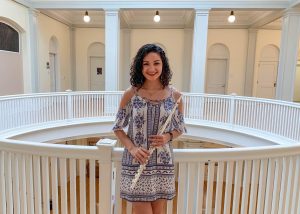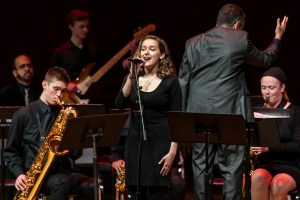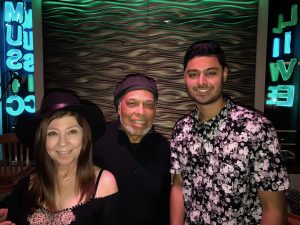by Parth Upadhyaya

Yadira Rodríguez-Cruz clicked send on the morning of April 20. And that was it.
Her final project as a music student-teacher was submitted. She had nothing else to turn in for her last semester at UNC. It was all over.
But it wasn’t the way she’d envisioned finishing her time at Carolina. Not 70 miles away from campus at her parents’ Fayetteville home. Not away from the students she’d taught and her classmates and professors — a community she had hoped to celebrate the milestone of graduation with.
Just like thousands of other college seniors around the country, UNC seniors won’t receive a traditional send-off from undergrad life amid the COVID-19 pandemic.
Students were forced to adapt when the university announced on March 11 that it would extend spring break and transition to online instruction. For music majors, though, this challenge was especially difficult, since many of their department-related activities require in-person performance.
Rodríguez-Cruz — a music education and psychology double major — had to face all of these harsh realities. And it wasn’t easy.
“I was really struggling the first few weeks back home,” she said. “(I was) like, ‘I’m not supposed to be here right now. This is not supposed to be happening like this.’”
Canceled
Rachel Despard couldn’t believe it, either. Everything she’d worked four years to enjoy, one by one, canceled.
A senior voice major, Despard had looked forward to certain events, her senior voice recital being one of them. She also completed a CD project with a local organization as part of her honors thesis. Of course, the CD release party she would’ve had didn’t happen.

(Johnny Andrews/UNC-Chapel Hill)
She also worked with UNC’s chapter of Musical Empowerment, a non-profit organization that pairs college students with local K-12 students to provide free music lessons. Despard had taught voice lessons to a 10-year-old student, Gigi, for the past three years. Now, her final recital with Gigi — what was meant to be a culmination of the duo’s hard work — was canceled, too.
“It was like our last final project we were doing together,” Despard said, “and then that got canceled.”
Despard had a job offer to work in the marketing department for a record label prior to the pandemic, but now there’s an uncertainty as to whether the position she was offered will still be available when the U.S. is able to stop social distancing.
“There have been really sad moments,” Despard said, “and also a lot of uncertainty as far as jobs and things, which is kind of a little bit of a mess.”
Rodríguez-Cruz, an aspiring elementary music teacher, taught second- and fourth-grade music classes under a mentor teacher at Raleigh’s Douglas Elementary School as a part of the UNC Department of Music’s undergraduate music education licensure program.
Dating back to the end of last semester, she had completed 12 weeks of teaching before her time at the school was cut short.
Though Douglas Elementary transitioned to remote learning, Rodríguez-Cruz wasn’t allowed to directly communicate with her students electronically, since she wasn’t technically a Wake County Public Schools employee. She created instructional videos and activity plans for her students while at home, but it was her mentor teacher who had to implement the ideas in the virtual classroom.
Still, she’d occasionally receive emails from the students’ parents with videos or pictures of her students completing her assignments. It was those moments that allowed her to stay connected and feel like she was still having an impact.
“They’re really cute,” Rodríguez-Cruz said of the kids. “And then it’s like, ‘Oh my gosh! Somebody is doing (the activities), and somebody is looking at it.’”
Also a member of the Marching Tar Heels, Rodríguez-Cruz missed out on the band banquet. It would’ve been the last hoorah for marching band members, a time after UNC’s spring football game for a group dinner, jokes, dancing, and an award ceremony.
They would’ve received personalized plaques and graduation cords, both of which now sit in an empty Hill Hall.
Together Apart
Even though the department couldn’t be together to close the semester, UNC Music is still a community. These last six weeks proved that to be truer than ever.
Both Rodríguez-Cruz and Despard credited people within the department for their effort to make the transition to isolation a little more bearable.
“I think the music program is really special in that it’s small,” Rodríguez-Cruz said. “You get to know your professors one on one, and certain professors are checking in on us and making sure that we’re OK.”
Despard’s voice class had a final gathering over Zoom. Everyone shared their favorite things about the seniors. For Despard, it was moments like those that helped “make things a lot better.”
Voice lecturer Melissa Martin has also been a key part of a vital support system for Despard.
“We would talk like once a week over Zoom and just kind of catch up and see how things were going,” Despard said. “And she really helped me through that experience and was super supportive about my recital being canceled.”
Remaining connected required the commitment of many, though.
Rodríguez-Cruz has been thankful for communications coordinator Cat Zachary for updating students and faculty about the happenings of the department. She’s also been happy to be in group messages with fellow Marching Tar Heel members.
“Everyone’s just really rallying together, and we’ve got a million group chats with (our) sections and with leadership in marching band and things like that,” Rodríguez-Cruz said. “We talk to each other, check-in and make sure everyone’s doing OK.”
Through the changes the pandemic has brought, Despard said she’s learned to slow down, which is something she wasn’t able to do during previous semesters. She oftentimes felt her self-worth attached to her involvements and productivity. So, being stuck at home, in some ways, has offered a nice change of pace.
They’ve picked up hobbies they never had time for before — Despard has been experimenting with music production, for example — and they’ve spent more time with their families.
Most importantly, their resilience has been tested. And they’ve passed.
“I think our class is going to be very special when we start applying for jobs and things like that,” Rodríguez-Cruz said. “Like, ‘Yeah, I made it through OK with this. And everything that happened in our four years, I came out OK.’”
A Note from the Author

If you had told me three years ago that I’d be writing this piece, I would have said you were out of your mind.
Music? I mean, sure, I do love hip hop and rap. But I don’t know anything about jazz or strings or opera. I don’t know about bands or orchestras or different ensembles. Plus… wasn’t I supposed to have finished undergrad already?
The truth is, 19-year-old me — fresh out of his sophomore year at N.C. State, ready to transfer to UNC — thought he knew a lot more than he did.
And if this coronavirus pandemic has taught me anything, it’s that I don’t know very much at all. None of us do. But that’s OK.
I joined the UNC Department of Music as a work-study writer in August 2017. It was one of my first weeks on campus, and classes hadn’t even started yet. Trying to find a way to make money so I didn’t have to ask my parents to cover my “just-for-fun” costs, I scrolled through UNC’s work-study website and saw an open writing position. I applied, interviewed with Andrew Tie, a former communications coordinator for the department, and got the job.
I was happy to have the position. I had no idea how significantly my decision to accept it would impact my time at Carolina, though.
Along with my writing position, a few of my classes kept me around Hill Hall and Kenan Music Building, too. Even as a journalism major, I felt a sense of belonging in these buildings — the same way I’ve felt in Carroll Hall. During my time at UNC, I took: Introduction to Jazz with Stephen Anderson, The Art and Culture of the DJ with Mark Katz, Introduction to Black Music with Aaron Harcus, and this semester, Hip Hop Diplomacy with Katz.
These professors have been in the top tier of instructors I’ve had as an undergrad. It didn’t matter if I had a question about their material or just wanted to chat about life. They made time. And I can’t thank them enough for that.
But nothing, of course, made me feel more connected to the department than my work-study job.
I’ve been grateful to work with Cat Zachary, the current communications coordinator, and the other music department staff for two years. Through them, I’ve learned a lot about music (they never got annoyed with all the questions I’d ask as I’d write concert previews or feature pieces). More importantly, I’ve learned that it’s important not to take myself too seriously, and to not sweat the small stuff — two important lessons I still often try to remind myself.
The people in this department make it so easy to see why UNC Music is the community that it is. And I’m so thankful things didn’t go the way I “perfectly” planned in my head so I could be a small part of it.
